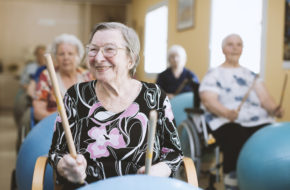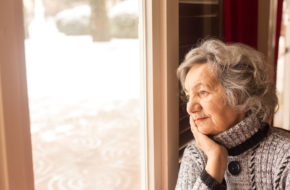A 16-year-old client of Diakon Family Life Services experienced persistent symptoms of anxiety, including difficulties in sleeping and excessive worry about school and interactions at school. Before long, he was using drugs to cope with the situation.
Through work with a Diakon Family Life Services therapist, the young man was able to learn new ways to reduce his stress and, in turn, was able to conquer his anxiety. Skills he learned included deep breathing to assist with anxiety-reduction, positive self-talk, how to “work” with pressure instead of against it and agenda-creation to manage school work. That step helped to reduce stress associated with homework and related projects.
And, of course, he is not alone.
A 13-year-old girl requested counseling services for high anxiety and an inability to concentrate in school. After four months of therapy, however, she reports her anxiety to be at an all-time low. She can now engage in more social activities without anxiety, increasing her number of friends and gaining renewed interest in artistic endeavors. She benefitted significantly from talking through her anxiety, learning thought-stopping techniques, and engaging in calming skills such as mindfulness.
Do you have a child or teen about whom you are concerned? If so, Diakon Family Life Services staff members answer the following questions they often hear from parents and guardians. Of course, no article such as this is a substitute for professional therapy and if you believe your child might benefit from that, we urge you to contact us or another therapist for guidance.
Q. What is a common trigger for stress that most parents are surprised their child or teen is experiencing?
A. Unfortunately, parents are often surprised by how much their own stress affects the level of stress their child is experiencing. Plus, children and adolescents are often struggling to manage their own stress, which just becomes compounded by stress within the family itself. In fact, many parents are unaware how much their children worry about adult matters that they hear their parents discuss. Among key factors causing stress for young people are relationship issues, things they see in social media or on the internet, bullying, parental friction, school and peer relationships, parental expectations and the concerns and stresses friends are experiencing.
Q. What behaviors should parents or caregivers watch for to determine if children are struggling with anxiety?
A. There are a number of behavioral changes for which parents should stay alert. Among them are:
• Being nervous, appearing worried, easily distracted; withdrawing from family and friends
• A tendency to isolate, avoid, be panicked or secretive; hesitant about social interactions; paranoid about life events
• Angry or easily irritated
• Changes in sleep patterns such as falling or staying asleep or unexpected mood swings, such as crying
• Cell-phone attachment
• Avoidance of certain activities, appearing stressed
• Gastrointestinal issues
• Restrictive or over-eating; hair-pulling and self-harm (in extreme cases)
• Reports of physical symptoms such as headache or stomachache
• Not wanting to attend school
• Excessive video-game use, drug or alcohol use
• Not spending as much time with friends as usual
• Lack of motivation
Q. What can parents do in their own lives to make children and youths less anxious?
A. One of the more important actions is to provide a safe home environment and keep your own anxiousness in check. Parents also can help structure their children’s lives so they have a more predictable schedule, responsibilities and bedtimes. Further, parents need to be aware of their use or overuse of substances; reduce preoccupation with electronics and cell phones, along with social media. Spend one-on-one time with each child.
Beyond that, you can model healthy habits and positive coping skills, as well as ways to handle stressful situations. Discuss your availability and willingness to listen to children, expressing hope that any negative situations will change and always talking in a calm and loving manner. Certainly, keep open communication, give children and youths their “space” and avoid telling young people about problems that do not concern them, such as relationship issues, finances or family drama. Be sure to provide children with a safe place to express themselves without judgment.
Other suggestions include limiting screen time and social-media use, having realistic boundaries, increasing time for family talk and routinely asking children about any concerns.
Q. What’s the difference between having “normal” anxiety and an anxiety disorder?
A. While no definition fits every situation, an anxiety disorder is more severe, with the anxiety causing great distress and interfering with the activities of daily life. In fact, it will tend to make normal tasks a struggle. Regular anxiety is situational, whereas an anxiety disorder will occupy thoughts for more days than not over a longer period of time; it typically involves chronic anxious thinking patterns.
As overall information, anxiety is the body’s reaction to a “trigger” and is generally a short-term experience, being a response to a situation such as getting married, a birth or even taking a driver’s test. In some cases, this type of stress can have a positive effect by generating motivation. An anxiety disorder is a sustained mental health disorder that can be triggered by stress and impedes your ability to carry out your normal daily activities; often, it is a response to a real or imagined threat.
It’s important to remember that everyone experiences anxiety and can typically cope with it. Coping becomes much more difficult when it involves, for example, excessive and perpetual worrying that interferes with life; such a diagnosable anxiety disorder would need further attention by professionals.





